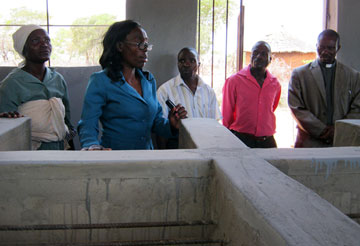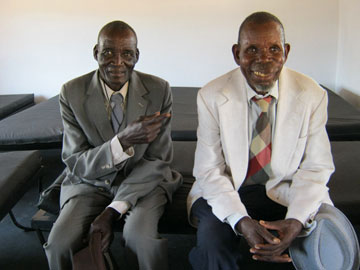With a sprightly spring in their steps, Jackson Munatsi, 74, and fellow villager Richard Denhere, 74, enter the freshly painted room. Munatsi gestures his counterpart to take a seat on the narrow hospital bed. The elderly duo is not suffering from any ailment and their faces light up as they narrate how a Zimbabwean tradition has brought joy to their lives.
They are seated in the recently completed waiting mothers' shelter at Denhere Clinic in Chirumhanzu communal area, some 250 kilometers south of the capital, Harare. Designed to serve pregnant women awaiting delivery, the shelter has been furnished with 12 beds and will open its doors when lockers and cupboards for storing the patients' personal belongings are delivered.
"Chabadza found us working on rebuilding the shelter whose structure had totally collapsed," said Munatsi, chairperson of the Health Centre Committee.
Zimbabwean tradition dictates that farmers going to the field take extra hoes, or mapadza. Neighbors and friends passing the field are to take up a spare hoe and lend a hand to get the work done faster. The practice is known as chabadza.
In this communal spirit, the United Methodist Church in Norway and Zimbabwe teamed to form the Chabadza Community Development Program. There are now five projects in the Mutasa-Nyanga and Masvingo districts of the Zimbabwe Episcopal Area.
Juliet Marara, secretary of the Chabadza committee at Denhere clinic said the shelter was started in 1982 by the government but never completed. "The Health Centre Committee was established to maintain structures at the clinic and every household in the area served by the clinic was levied $0.50 US per month to contribute toward maintenance and refurbishment."
Funds raised by the Health Centre Committee were used to resuscitate the incomplete building. It was while the community was struggling with this work that Chabadza stepped in. "The community had given the local UMC pastor, Taurai Kandori, free accommodation at Denhere School, and when he saw the villagers' development efforts he introduced Chabadza to us," Marara said.

Juliet Marara (with baby on her back) and Abigail Mwadiwa demonstrate the convenience of the new cooking area of the shelter.
For Marara and her peers of child-bearing age, the shelter is a blessing. They no longer have to travel 20 kilometers to the nearest health centre with a waiting mothers' facility.
"Women were being referred to a hospital about 20 kilometers away yet we have a trained midwife at our clinic. This development enables expectant mothers who live far from the clinic to come and stay here while awaiting delivery, thereby ensuring they are within reach of professional medical attention at the onset of labor or should any complications arise."
The United Methodist Church provided material for roofing, painting, lockers, 12 beds and mattresses for the expectant mothers' facility and an adjacent kitchen with a total value of $7,000 US. The cooking areas in the kitchen needed to be rebuilt at elbow level where pregnant women can comfortably cook without straining themselves. The church provided iron bars for the stoves and a security screen.
Denhere, the village headman, was overjoyed by the assistance rendered by the church. "Chabadza found us hard at work, but we could not afford to buy some of the materials required to complete this shelter and kitchen. UMC through Chabadza bought roofing material, paints and furnished the shelter, which is now ready for use."
The Chirumhanzu community received the materials on Sept. 18, 2012, and local laborers completed the construction. Marara said they floated a tender and selected builders who had a good track record and whose fee was competitive.
"We had set beginning of December as our deadline for completing the buildings. We beat that target with a month to spare," she said.
Other projects in the pipeline
The Chirumhanzu villagers are not resting on their laurels. They have other development projects they want to embark on, possibly with the assistance of Chabadza. Marara said three major projects are in the pipeline.
"Following the successful completion of the mothers' shelter, we want to drill a borehole, and the area is currently being surveyed to find a suitable site. We also wish to build a preschool classroom block and a teacher's cottage at Denhere Primary School."
Headman Denhere says there are plans to build a toilet and bathroom block for the maternity patients. The health centre needs to be fenced with piglet wire to keep out pigs and other livestock.
"We need electricity at the clinic. The nearest place with electricity is Chiona Secondary School, just three kilometres away. We have a generator, which has broken down, and we now need a more reliable source of power," Denhere said.
The Chirumhanzu expectant mothers' shelter is one of three projects that have been completed under the Norway-Zimbabwe partnership, says the Chabadza program director, the Rev Lloyd Nyarota.
"We have successfully completed a water project at Saungweme in Manicaland and built a classroom block at Matombo School in Gutu," he said.
The Chabadza program started in April 2012 and is poised to make a mark in the lives of beneficiaries. For the people of Chirumhanzu, the program is a landmark in efforts to reduce maternal mortality because of expectant mothers delivering at home without professional medical attention because a clinic is too far to reach on foot and there is no reliable transportation system.
*Chikwanah is a communicator for the Zimbabwe Episcopal Area.
News media contact: Tafadzwa Mudambanuki, Nashville, Tenn. (615) 742-5470 or [email protected].
Like what you're reading? Support the ministry of UM News! Your support ensures the latest denominational news, dynamic stories and informative articles will continue to connect our global community. Make a tax-deductible donation at ResourceUMC.org/GiveUMCom.





